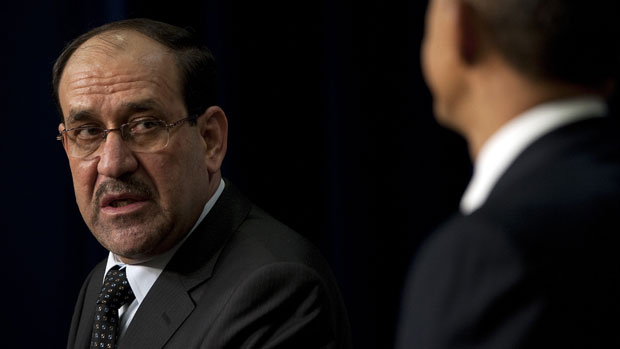Iraq's political power struggle ends as Maliki stands down
Nouri al-Maliki says he will back 'brother' Haider al-Abadi as prime minister for sake of Iraq's unity

A free daily email with the biggest news stories of the day – and the best features from TheWeek.com
You are now subscribed
Your newsletter sign-up was successful
Nouri al-Maliki has finally stepped down as Iraqi prime minister, ending the country's political deadlock and offering a glimmer of hope for stability in the region.
The 64-year-old had refused to resign after eight years in power, arguing that he was the leader of an alliance that won the most parliamentary seats in the nationwide April elections.
But as Islamic State militants advance across Iraq, he has faced mounting pressure to relinquish power to his Shi'ite rival Haider al-Abadi.
The Week
Escape your echo chamber. Get the facts behind the news, plus analysis from multiple perspectives.

Sign up for The Week's Free Newsletters
From our morning news briefing to a weekly Good News Newsletter, get the best of The Week delivered directly to your inbox.
From our morning news briefing to a weekly Good News Newsletter, get the best of The Week delivered directly to your inbox.
Yesterday, he stood alongside Abadi and announced that he would back the efforts of his "brother" in forming a new government for the sake of Iraq's unity.
"I announce before you today, to ease the movement of the political process and the formation of the new government, the withdrawal of my candidacy in favour of brother Doctor Haider al-Abadi," he said. Maliki has also withdrawn a legal case that he had lodged against President Fouad Massoum for nominating Abadi as the new Iraqi leader.
The speech was "heralded as historic in a region where the smooth handover of power in a democratic framework is rare", says the Washington Post. It also opens the door for further military support from the US, which had urged the country to replace Maliki with a more unifying figure.
Iraq's top Shi'ite cleric Grand Ayatollah Ali Sistani and Iran, which wields significant influence in Iraqi politics, had apparently played a role in ushering Maliki out. The final decision was made after a meeting with senior members of his party. One senior Shi'ite politician said Maliki had been "at a dead-end road" but said that "hopefully" his resignation will "help to bring stability".
A free daily email with the biggest news stories of the day – and the best features from TheWeek.com
Nevertheless, concerns have been raised that Abadi, a long-term member of Maliki's Dawa party, is too closely associated with the outgoing premier.
Hayder al-Khoei, an Iraq analyst at London's Chatham House think tank, told the Washington Post that Abadi will face the "same problems" as Maliki, including the Islamic State crisis. "The outlook is bleak," he said, "but there's hope at least."
-
 Local elections 2026: where are they and who is expected to win?
Local elections 2026: where are they and who is expected to win?The Explainer Labour is braced for heavy losses and U-turn on postponing some council elections hasn’t helped the party’s prospects
-
 6 of the world’s most accessible destinations
6 of the world’s most accessible destinationsThe Week Recommends Experience all of Berlin, Singapore and Sydney
-
 How the FCC’s ‘equal time’ rule works
How the FCC’s ‘equal time’ rule worksIn the Spotlight The law is at the heart of the Colbert-CBS conflict
-
 Epstein files topple law CEO, roil UK government
Epstein files topple law CEO, roil UK governmentSpeed Read Peter Mandelson, Britain’s former ambassador to the US, is caught up in the scandal
-
 Iran and US prepare to meet after skirmishes
Iran and US prepare to meet after skirmishesSpeed Read The incident comes amid heightened tensions in the Middle East
-
 Israel retrieves final hostage’s body from Gaza
Israel retrieves final hostage’s body from GazaSpeed Read The 24-year-old police officer was killed during the initial Hamas attack
-
 China’s Xi targets top general in growing purge
China’s Xi targets top general in growing purgeSpeed Read Zhang Youxia is being investigated over ‘grave violations’ of the law
-
 Panama and Canada are negotiating over a crucial copper mine
Panama and Canada are negotiating over a crucial copper mineIn the Spotlight Panama is set to make a final decision on the mine this summer
-
 Why Greenland’s natural resources are nearly impossible to mine
Why Greenland’s natural resources are nearly impossible to mineThe Explainer The country’s natural landscape makes the task extremely difficult
-
 Iran cuts internet as protests escalate
Iran cuts internet as protests escalateSpeed Reada Government buildings across the country have been set on fire
-
 US nabs ‘shadow’ tanker claimed by Russia
US nabs ‘shadow’ tanker claimed by RussiaSpeed Read The ship was one of two vessels seized by the US military